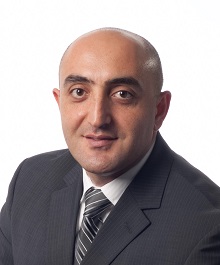
Dr. Hayk Khachatryan, who joined UF 13 years ago after completing his M.A., Ph.D., and Post-Doc with the School of Economic Sciences at Washington State University, has recently been promoted to full professor of Food and Resource Economics.
An expert of behavioral and experimental economics stationed at the UF/IFAS Mid-Florida Research and Education Center, much of Dr. Khachatryan’s work focuses on consumer economics, sustainable practices in the U.S. horticulture industry, and estimation of the industry’s economic impacts and finding ways to improve their profitability and marketability.
For example, recently some of his work has included looking at preferences for sustainable residential lawns in Florida, the effect of pollinator-related information and consumer preference for pest-management labeling on horticultural products (and their willingness to pay a price premium for ones grown without certain insecticides), and assessment of the production costs and profitability for greenhouse-grown perennial plants.
“Because horticulture is a mature industry, there was and still is a lot of competition among the big players in the industry,” Khachatryan said. “Given the competitive landscape, it was important to understand where the industry is headed in terms of what consumers expect from them, and trying to incorporate these environmentally friendly attributes in their product offerings was one way to differentiate their products.”
In addition, Khachatryan has extensively explored consumer perceptions of labels and their willingness to pay for specific horticultural traits and for different food or beverage products based upon nutrition content, using state-of-the-art eye-tracking and facial recognition technology to determine how label design may influence purchasing decisions through research at his Consumer Behavior Lab.
In his research, Khachatryan continues to pioneer the use of bio-metric tracking technology into traditional choice analysis to better understand individual decision-making behaviors.
“Visual attention information generated through the use of eye tracking equipment is one of the most explicit ways to tell if people paid attention to something,” Khachatryan said.
Khachatryan has exemplified leadership in his academic service not just to the department but to the advancement of the field of agricultural economics as a whole, serving as a founding member of the Agricultural and Applied Economics Association’s (AAEA) Experimental Economics Section in 2015, and a founding member of its Specialty Crops Section one year later in 2016.
As he continues his tenure at the Mid-Florida Research and Education Center (MREC), Khachatryan looks forward to the opportunity to continue doing new things in service of the community.
“One of the enjoyable things is that you always learn something new,” Khachatryan said. “It’s not a repetitive type of work. But what I enjoy the most is the feeling that you are able to help some industry group or improve the human condition, whether it’s through environmental conservation or better understanding consumer’s needs.”
 0
0
